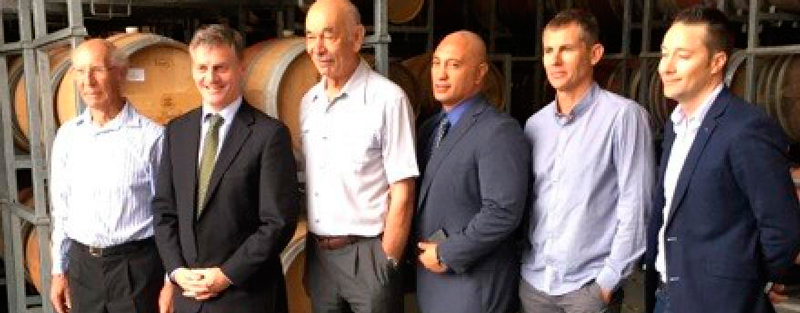This year one of New Zealand’s oldest and most respected family-owned wine producers, Babich Wines, celebrates its 100th anniversary. It truly is an international success story, as 2016 also happens to mark 35 years of exports for the Babich brand.
By Glenn Baker.
It’s surprising to learn that one of the best known New Zealand wine brands on the world stage was first exported from these shores somewhat by chance. In 1981, a German tourist came to the cellar door shop of Babich Wines in Henderson Valley, West Auckland, to try the wines of founder Josip Babich.
“He enjoyed what he tasted and asked my father if he could import a container of wine into Germany,” explains Babich Wines general manager and Josip’s grandson David Babich. “Arrangements were put in place and the container left New Zealand shores around four weeks later.
“For my grandfather, seeing a container heading back to Europe, which he had left some 70 years earlier, was the high point of his winemaking career.” – David Babich.
“For my grandfather, seeing a container heading back to Europe, which he had left some 70 years earlier, was the high point of his winemaking career,” says David. “He died, aged 87, only two years later so he was not to know the company would continue to grow exports as the major part of the business.”
Indeed, Josip would be very pleased with the fact that today 90 percent of Babich Wines production is sold to export markets.
Not surprisingly, progress in export sales was painfully slow in the early days. New Zealand’s export wine industry was in its infancy.
“At first no one knew anything about exporting, but we worked with a freight forwarder to understand the process better,” remembers David. “The logistical process was the easiest part. But understanding foreign exchange, how to price for the market, and how to support our wines in-market were considerably more challenging. So we learnt along the way.
“This is before Sauvignon Blanc was recognised; back then we were exporting Rieslings, Chardonnays, Pinots, etcetera. New Zealand was unknown for these wines, or any wines, so it was difficult to get traction in export markets.”
Once that first container was shipped in 1981 the company turned its focus to growing exports, but it would take until 1997 before export sales exceeded domestic sales.
“There was a lot of investment, mainly in travel, to meet and assign distributors in various markets and to understand how best to fit our products to their markets,” explains David.
He says other milestones along the export journey include introducing Marlborough Sauvignon to the brand’s export sales in 1990 and hiring sales staff for the key markets – the US, UK/Europe and China – which occurred from 2012 to 2015.
Today the Babich Sauvignon Blancs are the most sought after of all their varieties and represent 85 percent of the export product mix. The United States remains the company’s largest single export market, representing 30 percent of export sales.
David Babich has one piece of export advice that’s particularly relevant to the wine export industry, and that is the requirement to travel a lot to support the various export markets.
When Exporter caught up with him in early May he was staying at a hotel in Houston, Texas. He was in the city to support the Texas distributors of Babich Wines by working with their sales people over a whole week.
David says he personally finds it incredibly rewarding being in one of their export markets, such as New York, London or Beijing, and meeting people who absolutely love their wines.
“It is the best feedback for all the effort that goes into growing grapes, making wine, the sales and marketing effort, and overall business administration – that in the end, someone enjoys [our wine] and tells us.”
Success factors
Today wine exporting is a highly sophisticated and competitive sector, with a large number of brands competing for market share around the world. So what does David believe will be the key to success in world markets going forward?
“Good brand support is always essential,” he says. “Getting to know our customers, our distributors – that’s important to us as a family business.
“Overall, for New Zealand wine in general, it’s critical that we maintain a premium position. Australia makes some world-class wines but it has lowered its image with increasingly low priced wines, and it’s difficult to reverse this. New Zealand should not follow their example.”
As for the current export goals for Babich Wines, David says the brand is currently enjoying double digit growth in export markets. “We are getting behind this growth with further investment to see how far we can take it.”

